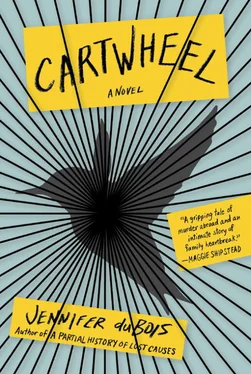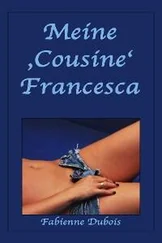That afternoon, Eduardo submitted his request to schedule the hearing before the instructor judge. He felt he had enough to say.
January
Lily had lately come to two conclusions: one, we will all be dead one day; and two, we are not dead yet.
It was possible she had always known the first thing. In Lily’s family, the winter—all winter, every winter, even these twenty-four years later—was hallowed, depressive ground, everyone tiptoeing around the memory of Janie, the daughter who had died in the winter two years before Lily was born. In the photo on the mantel, Janie was square jawed and sensible faced, like Lily and Anna; you could tell she would have grown up passably pretty if she’d ever learned not to look so severe. But in the picture Janie is only two years old, and riding a rocking horse is taking all of her attention, and anyway she will be dead in a year so you can’t blame the kid for not having a sense of humor. Lily had looked at that picture countless times, and more than wishing that Janie had lived—though she wished that, too, of course she wished that—she wished that Janie had been a boy, or that she herself had been a boy, because losing that first daughter had really ruined her parents for daughters.
Lily’s childhood had been, accordingly, criminally tedious: all happiness scrupulously prescreened, all sorrow decidedly offstage. She and Anna had coasted along, passively reactive to the most benign of benign stimuli—roller-skating parties, two trips to Disney World, craft projects at their school (which was a public school but was in a terrific neighborhood and thus tremendously well resourced). Visits to Janie’s grave were firmly linked to holidays, primarily oriented around all of the objects involved (the selection of flowers, the placement of balloons, the clearing away of dead grass), and always felt about as scripted and dispassionate as a congressional filibuster. Perhaps not coincidentally, Andrew and Maureen’s divorce, when it finally came, achieved what must have been a level of truly world-record-shattering tepidness: After years of existing in a collective state of medicated and vacant life-tolerance, they merely drifted off into separate ethers, and that was that. They were, essentially, zombies. Both Anna and Lily agreed on this—though Anna tended to think their zombie state was forgivable and understandable and Lily tended to think that life was short and that, yes, a terrible thing had happened, but that terrible thing had happened long, long ago and one day everyone would be dead and nobody would get any extra points for having hated life so much. Because Andrew and Maureen did hate life, really: They were just always very polite to it.
So yes, Lily was familiar with the concept of mortality. What was newer, maybe, was this acute sense of awareness, of aliveness, of gratitude. It was Argentina that had given it to her. The feeling had started on the airplane, when the rust-colored light wheeled through the windows, illuminating the blond hairs on the arm of the flight attendant as she poured the wine, and Lily felt her life beginning to open. She’d grinned idiotically right through losing money at a criminal exchange rate at EZE, right through a startlingly pungent Subte ride, and right through the first day and a half with the host family, the Carrizos. The Carrizos were perfect: Carlos was in real estate and Beatriz stayed at home, though she dressed well and always seemed busy, and they were both charming and, crucially, gently incurious about Lily’s whereabouts. They understood English, but Beatriz pretended not to, so Lily got to practice her Spanish whenever they spoke, which she loved. She loved, as it happened, almost everything. She loved her room, which was small and sunny, even though it was in the basement, and had a bunk bed with bright green sheets. She loved the huge, sagging house next door, which just had to be haunted. She loved the chorizo sandwich—with its smoky-tasting egg and salty, seeping cheese—that you could buy and eat on the street. She loved her academic schedule—a Wednesday morning political philosophy seminar, a creative writing independent study project, and a midday Spanish-language class that was widely viewed as optional. And most of all, maybe, she loved how close the Carrizos lived to Avenida Cabildo, where you could catch a bus to anywhere in the city. Already, Lily could feel herself expanding to fill the new space the world had afforded her; already, Middlebury was turning back into the collection of catalog snapshots it once had been—explosively autumnal trees, international relations textbooks, laughing groups of friends of improbable and, as it turned out, wholly unrepresentative racial compositions. Everything about Lily’s life there—Harold the economist, and those awful Hawaiian parties thrown by the coed social houses, and the hissing of the radiator in her formal logic class, and her articulate, bespectacled women’s studies classmates, doomed to eternally debate gender versus equity feminism—began to seem less real. All of that was the detritus of a shallow, conscripted life; all of that had merely been preparation for this: getting off a plane in a new country, in a new hemisphere, and emerging from the chrysalis of academia to fly off into the bald, stunning sky of reality. For a day and a half, Lily was thrilled. For a day and a half, Lily was free. And then Katy arrived.
Katy was Katy Kellers, the roommate. The informational email Lily had received from the program in December had revealed only that Katy attended UCLA and studied international finance, and this second fact, in particular, had left Lily unprepared for how distressingly beautiful Katy would be. Katy Kellers, it turned out, had dusky blond hair and preposterously even teeth and eyes that seemed somehow more dimensional than was normal. The day she arrived she wore a tight-fitting brown turtleneck—the kind of thing that could only flatter someone who ran very long distances recreationally (Lily had gone shopping with Anna often enough to know)—and, even after fourteen hours on a plane, did not appear to be the slightest bit tired.
“You’re Katy?” said Lily, holding out her hand.
Katy’s hand felt exactly like it looked. “And you’re Lily,” she said, and smiled. Those teeth! Lily was going to have a hard time getting over those teeth. Lily’s own mangled teeth had been hammered into relative normalcy by a series of truly gruesome procedures during high school (this was why she’d experimented sexually so much early in college, she’d explained to Anna once—because her teeth had been so bad for so long that her self-esteem had taken a while to iron itself out). Lily’s teeth were fine now, but not like Katy’s. Katy’s teeth were like the Platonic ideal of teeth.
Katy bent to unzip her suitcase and began rifling through a polychrome array of sweaters. The most feminine muscles Lily had ever seen toggled in her arms.
“So,” said Lily, climbing to the top of the bunk bed. “What brings you here?”
“Here?”
Lily swung her legs out over the side. “To Buenos Aires.”
Katy shrugged. “I wanted to go to Barcelona—actually, I was supposed to go with my boyfriend, we were supposed to go together, but then—”
“You broke up?”
Katy bit her lip—actually bit her lip! “We broke up, right, and so I decided to go somewhere else.”
“And by then all the other programs were full.”
“Well,” said Katy. “Not exactly. I could have gone to Senegal.”
“Oh,” said Lily.
Katy brushed her bangs with her fingers, even though they didn’t really need brushing.
“Yeah,” said Lily. “I mean, I think that’s why it’s hard to really commit to one person at our age. I was seeing a couple of people last semester, but nothing really serious, so I was sort of free to do whatever I wanted.”
Читать дальше












